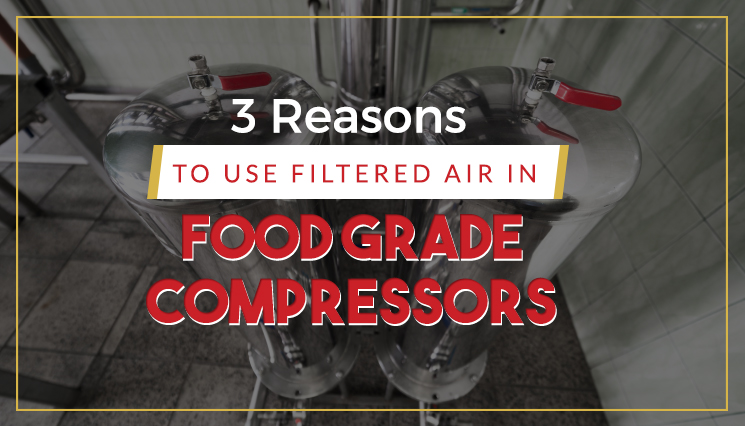Several businesses nowadays have bought food grade air compressors in order to meet industrial standards. Compressed air can blow crumbs off bread, blow-mold milk cartons, and help with product sorting and product packaging, among others. A few companies even use compressed air to freeze products and fill pies. It helps that food grade air compressors are also low-maintenance machines. Because they require less downtime, they also boost a company’s production.
One common concern, however, is whether the used air contains contaminants or not. Nowadays, food manufacturing facilities often make extensive use of compressed air throughout their plants. If the air in question is unfiltered, however, compressors can end up posing hazards to manufacturers and consumers alike. Here are 3 reasons that food grade air compressors ought to use filtered air.
3 Reasons Your Food Grade Compressors Should Use Clean Air
1. Compressed Air Can Come into Contact With Food Items.
This might not be immediately apparent because compressed air does not leave any traces, whether it is filtered or not. However, a single production line can present several potential contact points between food and compressed air, whether the contact is direct or indirect. Some potential contact points include:
-
- Sparging
- Mixing
- Drying
- Packaging (e.g. filling, bagging)
- Blow-Off
2. Untreated Compressed Air Can Endanger Consumers’ Health.
Generally, inlet air to a compressor contains up to 50 bacteria per cfm, together with particulate matter. Scaled up, this means that every hour, roughly one million bacteria can enter a 75-hp compressor with a capacity of 300 scfm. These bacteria remain in the compressed air as it travels through the system.
Food products that come into contact with the unfiltered air can easily become contaminated. Ready-to-eat food products are especially at risk, as there are usually little to no barriers in place to remove contaminants toward the end of the manufacturing process. The bacteria may then survive all the way through the consumption of the affected product.
3. Filtered Air Can Preserve Product Quality and Brand Reputation.
Bacteria and other contaminants can cause food products to spoil early. Aside from creating unnecessary wastage, this will require the manufacturer to work more to compensate for the losses.
A brand’s sales and reputation can both suffer greatly if contaminated goods enter the market. A company may be forced to make a costly product recall, cater to displeased customers, or even face charges in court because one or more buyers fell ill after consuming the contaminated food products. Since food hygiene legislation places responsibility on the manufacturer to ensure consumers’ health, microbial contamination of products can be viewed as a lack on control on the manufacturer’s part.
These 3 reasons present a strong case for investing in air filtration technology. Of course, you’ll want to find an air treatment solution that will fit the requirements of your production line. It helps to do your research, but it’s also highly advisable for you to consult experts before investing in a particular filtration system.
Compresstech is the Philippines’ leading source for high-quality air compressors, providing the most updated solutions for various industrial applications for over 30 years. Consult with us today to figure out which food grade compressed air systems and air treatment solutions are best for your factory.
Visit our blog for more informative articles about air compressors.

